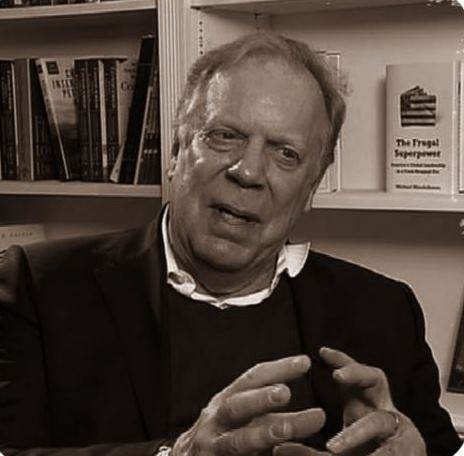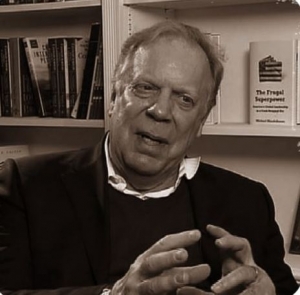Donald Jensen on Lavrov’s Pankisi Concerns
Last week, the statement of Russia’s notorious Foreign Minister, Sergei Lavrov that there are “reports” of Islamic State fighters training in Georgia’s Pankisi gorge was met with considerable concern. For many an expert and opinion maker, it hinted at a sign of bad things to come, such as one of those “counter terrorism operations” Russia has become infamous for since the Chechen conflicts. The response of Georgia’s newly appointed Prime Minister, Giorgi Kvirikashvili, that “there was no threat of terrorism coming from Pankisi Gorge,” did little to ease these concerns.
Lavrov’s statement was the chief talking point as Nana Sajaia of Voice of America’s Georgian Bureau sat down with renowned scholar Donald Jensen, currently a resident fellow at the Center for Transatlantic Relations in the Nitze School of International Studies at Johns Hopkins University, to discuss our northern neighbor’s shady strategies.
In your recent article you say that Russia’s policies put at risk its major ambitions, such as its ability to exercise power abroad. How so?
Russia’s ambitions were largely fueled by Russia selling its oil and energy commodities in the Putin era, which allowed Russians to become complaisant and gave Putin the freedom to act in certain ways that Russians might otherwise have not approved. Now, there is almost no hope of the oil price getting anywhere close to the 80 dollars the Russian budget needs to fund all its various commitments.
So Putin has big political problems. What is Putin going to do? You blame the West, you invade a country like Ukraine, you use information warfare to pretend Russia has enemies, when it really doesn’t, you divert attention, you create external enemies…These are all excuses for the fundamental political and economic crises in the system. And that is the central problem the Kremlin is facing today. It can no longer support being a great power. And in my opinion, it doesn’t really know what to do.
Some would argue Russia has been diverting attention to external conflicts, like Ukraine, and using it for internal mobilization.
I agree. We saw Ukraine used as a way to mobilize the population, but that passion, that enthusiasm is now clearly declining. So, what now? That’s the problem Putin faces. He can’t pump up the economy and people are getting sick of Ukraine.
Syria is something that brought Putin from international isolation to the discussion table. How will that affect regional politics? Would you say there is a bigger risk that a country like Georgia might be compromised?
Yes, Putin has become relevant to the discussion, at least about Syria, and that was one of his goals in doing what he did. Despite everything, there is still significant disagreement about the future of the Assad regime, about who the enemy is, and you see Russia is talking constantly about the fight against terrorism, while its primary goal remains to protect Assad. I don’t see any solid diplomatic solution anytime soon.
Last week, Russia’s Foreign Minister Sergei Lavrov said there are “reports” of Islamic State fighters training in Georgia’s Pankisi gorge. Do you think it can be used as a justification to cross into Georgia again?
That’s obviously why he said it. This kind of rhetorical discussion creates a certain mindset, prepares people for what could happen. I found it very, very worrying. If you claim there are terrorists, and of course Moscow is allied with the West on fighting terrorism, that allows you to move around with relative impunity, because you could do something in Georgia and tell everybody it was a terrorism operation, and their troops are still there. That’s my first point.
The second point would be – it is very dangerous to allow the Kremlin to talk about the internal affairs of Georgia or Ukraine as if they are entitled to do so or as if their involvement is somehow required. Georgia is a separate country, Russia has no business talking about the national security of Georgia unless Georgia asks for it. Let Georgia solve its own problems unless Georgia decides to ask for Russian help, which Georgia has not.
How would you compare the current and previous governments of Georgia in dealing with this situation?
I don’t like to be involved in internal politics. The current Georgian government is not where I’d like to be on some of these issues, and uses what I call a multi-vector foreign policy more than I might like. On the other hand, I understand the pressures from the North and East, and I understand how difficult it is. But if it were me, I would hope for more robust resistance to some of those external pressures.
Frankly, given the concerns about the 2012 elections when the government changed, Georgians have done better than a lot of people feared. At the time, given Ivanishvili’s background, some saw him as a tool of Moscow, but Georgia has tried to continue its course towards Western integration and it deserves credit for this.
Everything you see about Ivanishvili, his career and business background, suggests close ties to Moscow. This is worrying. Because in Russia, power is money and money is power. He, on paper, suggests an affinity for some of the influences from Russia that a lot of people in the West are not comfortable with, but at the same time Georgia states firmly it wants to be in NATO and Western Institutions, and that is a good thing.
For the full interview in Georgian, go to: www.amerikiskhma.com
Nana Sajaia












